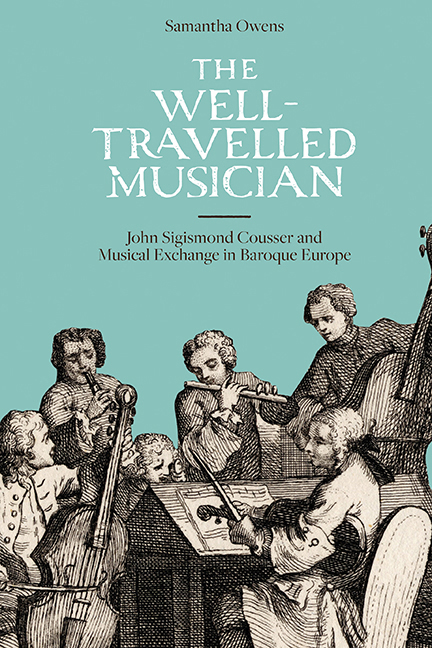Book contents
- Frontmatter
- Dedcation
- Contents
- List of Tables
- Preface
- Abbreviations
- Notes on Sources
- Introduction: John Sigismond Cousser and his ‘Commonplace Book’
- 1 Hungarian Beginnings and the Adoption of French Musical Style
- 2 Kapellmeister at the Wolfenbüttel Court and Braunschweig Opera House
- 3 Ariadne to Porus: Cousser's Braunschweig Operas
- 4 ‘The Incomparable Director’ in Hamburg, Nuremberg and Augsburg
- 5 Heliconische Musen-Lust: Opera at the Württemberg Court
- 6 ‘Il Paradiso terrestre’? Cousser in London
- 7 ‘Fortune not Blind’: Music for Dublin Castle
- 8 ‘Our Concert’: A Musician at Home
- 9 Cousser's ‘collection of fine musick’ and the Practicalities of Musical Exchange
- Appendix 1 Summary of the Contents of Cousser's ‘Commonplace Book’
- Appendix 2 Cousser's Address Book
- Appendix 3 Cousser's Books of Cantatas, Madrigals, Duets and Serenatas
- Appendix 4 Cousser's Inventory of Ouverture Incipits
- Appendix 5 Transcription of Cousser's Notes for his 1716 Trip to London and the Continent
- Bibliography
- Index
- Titles listed here were originally published under the series title Music in Britain, 1600–1900
- New titles published under the series title Music in Britain, 1600–2000
8 - ‘Our Concert’: A Musician at Home
Published online by Cambridge University Press: 30 August 2019
- Frontmatter
- Dedcation
- Contents
- List of Tables
- Preface
- Abbreviations
- Notes on Sources
- Introduction: John Sigismond Cousser and his ‘Commonplace Book’
- 1 Hungarian Beginnings and the Adoption of French Musical Style
- 2 Kapellmeister at the Wolfenbüttel Court and Braunschweig Opera House
- 3 Ariadne to Porus: Cousser's Braunschweig Operas
- 4 ‘The Incomparable Director’ in Hamburg, Nuremberg and Augsburg
- 5 Heliconische Musen-Lust: Opera at the Württemberg Court
- 6 ‘Il Paradiso terrestre’? Cousser in London
- 7 ‘Fortune not Blind’: Music for Dublin Castle
- 8 ‘Our Concert’: A Musician at Home
- 9 Cousser's ‘collection of fine musick’ and the Practicalities of Musical Exchange
- Appendix 1 Summary of the Contents of Cousser's ‘Commonplace Book’
- Appendix 2 Cousser's Address Book
- Appendix 3 Cousser's Books of Cantatas, Madrigals, Duets and Serenatas
- Appendix 4 Cousser's Inventory of Ouverture Incipits
- Appendix 5 Transcription of Cousser's Notes for his 1716 Trip to London and the Continent
- Bibliography
- Index
- Titles listed here were originally published under the series title Music in Britain, 1600–1900
- New titles published under the series title Music in Britain, 1600–2000
Summary
THE printed serenata librettos and newspaper reports of Cousser's musical activity at Dublin Castle represent only the public face of what the musicologist Brian Boydell has referred to as Cousser's ‘apparently limited activity’ in Ireland. In reality, though, his music-making surely took place on a regular basis in a variety of different settings, from providing music lessons for wealthy Dubliners in their own homes and participating in the music making of private music clubs to the occasional staging of recitals that formed part of the city's nascent public concert scene during in the early decades of the eighteenth century. Cousser's inventory of the contents of his residence in Dublin also provides fascinating clues regarding his standard of everyday living and the extent to which he may have been equipped – both materially and intellectually – to move between different levels of Dublin society.
❧ Philip Perceval's ‘Concert’
The primary evidence for Cousser's involvement in regular, organized private music making lies in a collection of letters held by the British Library and stemming from the estate of Sir John Perceval, whose strong interest in music manifested itself early. By 1701, his Oxford tutor was reporting to John's guardian, ‘I think the greatest occasion of Sir John's expences has been his love of Musick, which has engaged him to have more entertainments at his chamber than otherwise he wou'd have had …’ John shared his passion with his younger brother Philip, and their correspondence frequently mentions music-making. Not surprisingly, then, given the Perceval brothers’ enthusiasm for music, passages in their correspondence indicate that Philip was an active participant in a private, Dublin-based music club. Referred to by him as ‘our Concert’, the group met regularly throughout the winter season, from around October or November until April, when the Anglo-Irish aristocracy retreated to their country estates for the summer months.
Philip's letters attest to the direct involvement of professional musicians alongside aristocratic amateurs, the former including his colleagues at Dublin Castle, William Viner, Cousser and (from the early 1720s) the celebrated violinist Matthew Dubourg. Replying to his brother in December 1721, Philip wrote, ‘Dear Brother, The day before yesterday yours of the 7[th]. came to my hands, which being our Concert-day I cou'd not then answer. Dubourg has not fail'd us one night, & you must believe he is no small addition to the performance.’
- Type
- Chapter
- Information
- The Well-Travelled MusicianJohn Sigismond Cousser and Musical Exchange in Baroque Europe, pp. 145 - 161Publisher: Boydell & BrewerPrint publication year: 2017



